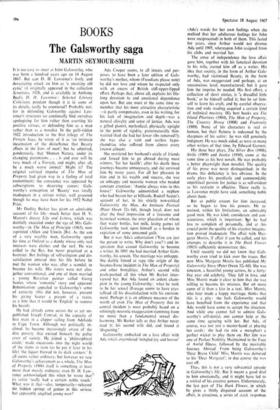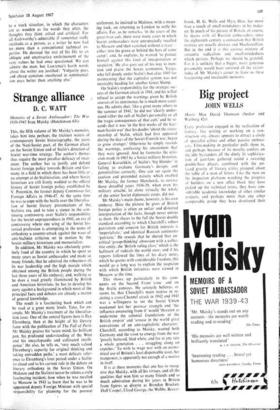The Galsworthy saga BOOKS
MARTIN SEYMOUR-SMITII
It is too easy to sneer at John Galsworthy, who was born a hundred years ago on 14 August 1867. But can D. H. Lawrence's lively. and devastating attack on him as 'a sneaking old cynic' (it originally appeared in the collection Scrutinies, 1928, and is available in Anthony Beal's D. H. Lawrence : Selected Literary Criticism), petulant though it is in some of its details, really be countered? Probably not; for in defending Galsworthy against Law- rence's strictures we continually find ourselves apologising for him rather than asserting his positive virtues, or defending him as a man rather than as a novelist. In the guilt-ridden 1922 introduction to the first trilogy of The Forsyte Saga, he wrote of it as 'an intimate incarnation of the disturbance that Beauty effects in the lives of men'; but he admitted, ponderously, that 'Human Nature, under its changing pretensions . . . is and ever will be very much of a Forsyte, and might, after all, be a much worse animal.' Might it? The original satirical impulse of The Man of Property had given way to a feeling of total contentment; the conscience was appeased by subscriptions to deserving causes; Gals- worthy's conception of 'Beauty' was totally inadequate in a serious writer, well groomed though he may have been for his 1932 Nobel Prize.
Mr Dudley Barker has given an admirable account of his life—much better than H. V. Marrot's dreary Life and Letters, which was dutifully executed under the eye of Mrs Gals- worthy—in The Man of Principle (1963), now reprinted (Allen and Unwin 28s). As the son of a very wealthy man, Galsworthy spent his time at Oxford as a dandy whose only real interests were clothes and the turf. He was called to the Bar, but never practised as a barrister. But feelings of self-criticism and dis- satisfaction entered into his life before he met the woman who was, after a scandal, to
become his wife. His sisters were not alto- .
gether conventional, and one of them married a young Bavarian painter called Georg Sauter, whose 'romantic' story and apparent Bohemianism appealed to Galsworthy's sense of curiosity (this did not, however, prevent his giving Sauter a present of a razor, as a hint that it would be 'English' to remove his beard).
He had already come across the as yet un- published Joseph Conrad, in the capacity of first mate in a clipper sailing from Adelaide to Cape Town. Although not politically in- clined. he became increasingly aware of the dire poverty that existed beneath the polite crust of society. He joined a 'philosophical circle,' made excursions into the night world, of the slums to taste (as he put it later in his life) 'the liquor brewed in its dark corners.' It all seems rather ordinary; but however we rate Galsworthy's achievement as a whole, The Man of Property (1906) itself is something at least more than merely ordinary; even D. H. Law- rence acknowledged this when he wrote that its satire 'really had a certain noble touch.' What was it that—alas, temporarily—released the hidden springs of genius in this serious but apparently ungifted young man? Ada Cooper seems, to all intents and pur- poses, to have been a later edition of Gals- worthy's mother, whom (Freudians please note) he did not love and whom he respected only with an excess of British stiff-upper-lipped effort. Perhaps that, above all, explains his life- long devotion to and emotional dependence upon her. But one must at the same time re- member that his most attractive characteristic —it partly compensates, even in his writing, for his lack of imagination and depth—was a natural chivalry and sense of justice. Ada was a gifted pianist, methodical, physically upright to the point of rigidity, preternaturally thin- waisted (had she had her lower ribs removed?); she was also a vain and restless hypo- chondriac who suffered from almost every known ailment.
She restricted her husband's circle of friends and forced him to go abroad during most winters, 'for her health'; after his death these journeys became unnecessary, and she survived him by many years. For all her pleasure in him and in his wealth and success, she was an unhappy and neurotic woman who needed constant attention : 'Auntie always wins in this house!' Galsworthy admonished a nephew who had beaten her at billiards. Rudolf Sauter's account of her, in his strictly non-critical Galstvorthy the Man, An Intimate Portrait (Peter Owen 32s 6d), though loyal, does not alter the final impression of a tiresome and hysterical woman, the utter placation of whom (hot water bottles, hot milk, losing games to) Galsworthy took upon himself as a burden in expiation of some unnamed guilt.
But it was Ada's exhortation (`You are just the person to write. Why don't you?') and in- spiration that caused Galsworthy to become a writer. In 1891 she had married Arthur Gals- worthy, his cousin. The marriage was unhappy. She darkly hinted at rape (the origin of the Soames-Irene incident in The Man of Property) and other brutalities; Arthur's second wife pooh-poohed all this when Mr Barker inter- viewed her. But Ada found an ardent cham- pion in the young Galsworthy : what he took to be her sexual ill-usage seems to have crys- tallised all his dissatisfaction with his environ- ment. Perhaps it is an ultimate measure of the worth of even The Man of Property that its central incident is most probably based on a whiningly neurotic exaggeration stemming from no more than a fundamental sexual dis- harmony. Mr Barker tells us that Arthur never read it; his second wife did, and found it `disgusting.'
Galsworthy embarked on a love affair with Ada which engendered 'mingled joy and horror' (Ada's words for her own feelings when she realised that her adulterous feelings for John were reciprocated) in both of them. This lasted for years, since Arthur would not divorce Ada until 1905, whereupon John resigned from his clubs and married her.
The sense of independence the love affair gave him, together with his fanatical- devotion to his wife, started him off as a writer. His idea that society, in the form of Arthur Gals- worthy, had victimised Beauty, in the form of Ada, was exaggerated and perhaps, at an unconscious level, manufactured; but it gave him the impetus he needed. His first effort, a collection of short stories, is 'a dreadful little book,' as he himself called it; but he set him- self to learn his craft, and by careful observa- tion and wide reading acquired a certain kind of technical mastery. His best books are The Island Pharisees (1904), The Man of Property, The Country House (1908) and .Fraternity (1909). None of his characters is real or human, but their flatness is redeemed by the sharpness of his satire: he was still genuinely indignant. He was much aided, as were so many other writers of that time, by Edward Garnett.
His three best plays, The Silver Box (1906), Strife (1909) and Justice (1910), came at the same time as his best novels. He was probably a better playwright than novelist. The quality of his prose was never distinguished; in the drama this deficiency is less obvious. In the early plays his peculiarly and commendably unpolitical passion for justice is as self-evident as his restraint is effective. There really is, as Lawrence might have said, something noble about them.
But as public esteem for him increased, so he began to lose his powers. He re- mained, within his limitations, an admirably good man. He was kind, considerate and con- scientious, which is important; 1INt he had less to complain of personally, and at this crucial point the quality of his creative imagina- tion proved inadequate. The affair with Mar- garet Morris, if affair it can be called, and his attempts to describe it in The Dark Flower (1913) sufficiently demonstrate this.
Until recently we did not know that Gals- worthy even tried to kick over the traces. But now Miss Margaret Morris has published My Galsworthy Story (Peter Owen 32s 6d). She was nineteen, a beautiful young actress, he a forty- five year old celebrity. They fell in love, and Miss Morris made it clear to him that she was willing to become his mistress. But n6 more came of it than a kiss in a taxi. Miss Morris, who later made a happy marriage, thinks that this is a pity : she feels Galsworthy would have benefited from the experience and that Ada would have come to accept the situation. And while one cannot fail to admire Gals- worthy's self-denial, one cannot help at the same time agreeing with her. But Ada, of course, was not just a master-hand at playing her cards: she had (to mix a metaphor) a perfect wicket to play them on. Her line was one of Perfect Nobility Maintained in the Face of Awful Illness, followed by the inevitable Journey Abroad. From being Galsworthy's `Dear Brave Child' Miss Morris was demoted to his 'Dear Margaret'; in due course she was cast off.
Thus, this is not a very substantial episode in. Galsworthy's life. But it meant a good deal to him emotionally, and it might have led to a revival of his creative powers. Unfortunately, the last part of The Dark Flower, in which he gives a thinly disguised account of the affair, is atrocious, a series of stock responses to a stock situation, in which the characters are as wooden as the words they utter, the thoughts they think stilted and artificial. For all Galsworthy's .admirable if somewhat stuffy rectitude, as a person, as a writer he now had no. more than a conventional technical ex- pertise. He devoted the rest of his life to an oblique and unattractive enshrinement of the very. values- he had once questioned. We can admire the man, but Lawrence's harsh words about the writer are justified: 'Vulgarity pays, and cheap cynicism smothered in sentimental- ism pays better than anything else.'































 Previous page
Previous page